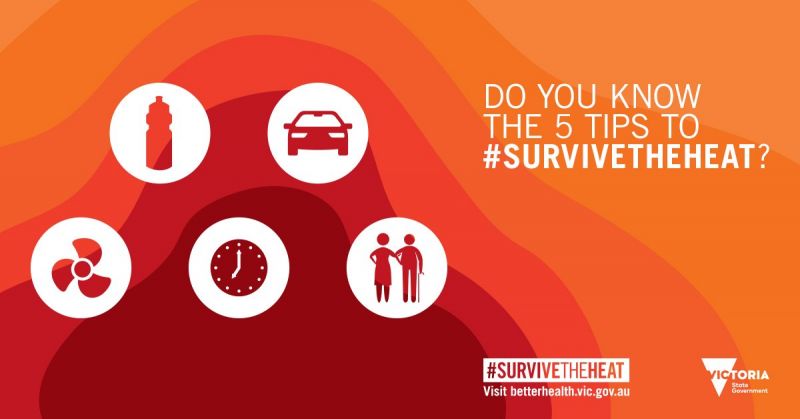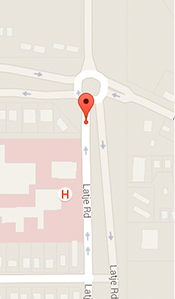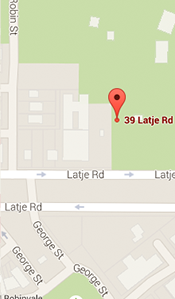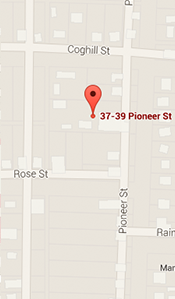HEALTH HEAT ALERT – MONDAY 14TH JANUARY – THURSDAY 17TH JANUARY 2019
Department Of Health Victoria, has issued a heat health alert for forecast extreme heat conditions at or above heat health temperature thresholds (based on the Bureau of Meteorology 7-day forecast).
Heat kills more Australians than any natural disaster. Extreme heat can affect anybody. Those most at risk are older people, young children and people with a medical condition.
Everyone should also prepare for the heat
Survive the heat this summer with these five simple tips:

Drink more water
- Drink plenty of water, even if you don’t feel thirsty.
- Keep a full drink bottle with you.
- Take small sips of water frequently.
If your doctor normally limits your fluids, check how much you should drink during hot weather.
Never leave anyone in a car
- Never leave kids, adults or pets in cars – the temperature can double in minutes.
- Visit Kidsafe’s websitefor more information on kids in hot cars – make sure to watch the video showing a piece of lamb being cooked in a car on a 27
Stay somewhere cool
- Spend as much time as possible in cool or air-conditioned buildings (shopping centres, libraries, cinemas or community centres).
- Keep yourself cool by using wet towels, putting your feet in cool water and taking cool (not cold) showers.
- Block out the sun at home during the day by closing curtains and blinds.
- Open the windows when there is a cool breeze.
- Stay out of the sun during the hottest part of the day.
- If you must go out, wear a hat and sunscreen and take a bottle of water with you.
- Wear light-coloured, loose-fitting clothing made from natural fibres like cotton and linen.
- Eat smaller meals more often and cold meals such as salads.
- Make sure food that needs refrigeration is properly stored.
- Avoid intense activity like exercise, renovating and gardening.
- Watch or listen to news reports for more information.
- Don’t forget your pets – a cool bath, wet towel to lie on, a place next to a fan and plenty of fresh water work just as well for animals.
Plan ahead
- Keep up to date with weather forecasts – watch the news daily, check the BOM forecast online
- Schedule activities for the coolest part of the day.
- Stock up on food, water and medicines so you don’t have to go out in the heat.
- Visit your doctor to check if changes are needed to your medicines during extreme heat.
- Store medicines safely at the recommended temperature.
- Check that your fan or air-conditioner works well. Have your air-conditioner serviced if necessary.
- Prepare for power failures – ensure you have a torch, battery-operated radio, fully charged mobile phone, food items that don’t require refrigeration, medications, plenty of drinking water and other essential items.
- Look at the things you can do to make your home cooler such as installing window coverings, shade cloths or external blinds on the sides of the house facing the sun.
Check in on others
- Look after those most at risk in the heat – your neighbour living alone, older people, young children, people with a medical condition and don’t forget your pets.
- Keep in touch with friends and family who may need help. Call or visit them at least once on any extreme heat day.
- Encourage them to drink plenty of water.
- Offer to help family, friends and neighbours who are aged over 65 or have an illness by doing shopping or other errands so they can avoid the heat.
- Take them somewhere cool for the day or have them stay the night if they are unable to stay cool in their home.
- If you observe symptoms of heat-related illness, seek medical help.
For more information the Better Health Channel



